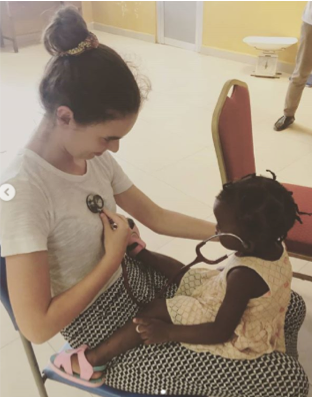Fenna is a sixth year Medicine student from Maastricht University. In July and August she was in the West-Gonja Hospital in Ghana to do her internship.
How was your stay in the MUSTANGH-house?
The accommodation was fine. It’s a big house with four bedrooms, a big living room, a kitchen, two bathrooms and a garden. There’s a lot of space, which means there’s also enough space if you want some little time for yourself. Mary cooks lunch every day and in the night Kassim will guard the house. This gave me a very safe feeling. We only had to walk five minutes from the house to the hospital.

How would you describe your daily activities abroad?
My daily activities during this internship were very alternately. We started in the emergency department every morning at 8 AM. Together with the other students, I say all new patients from the night and the morning and we assessed the patients in the hospital. At 9 AM the doctors came (which were only two for the whole hospital) to discuss all the patients one by one with us. We did this next to the bed of the patient. Most of the time they chose a subject to give education about. De doctor asked us a lot of questions and taught us about things we didn’t know. There was very good supervision, because we discussed all patients one by one and besides that the education was very good. After a few hours on the emergency department, everyone went to their own department to see the patients on their own. I was on the female ward, the children’s department and the gynaecology department. I saw the patients on my own. When I was ready, I called the doctor to discuss the patients and make policy for the next days.
In the afternoon I went tot the emergency department or the OPD. On the OPD, I saw all the patients on my own. Whenever I was in doubt, I could call one of the two doctors present to discuss the situation. There were also nurses in other OPD rooms, and I could also ask them questions when something was unclear. This made sure there was a safe working environment. There was always space for discussion with the doctors. Besides that, I had to contact the doctors by phone if I was about to admit patients to the hospital.
There wasn’t really such a thing as hierarchy. De doctors were for everyone really accessible, as well for me as for the rest of the students and the nurses. We could literally call them during the day and night. If they couldn’t answer due to for example an operation, they called me back as soon as possible. Besides that, there was always space for jokes and laughing. The atmosphere in the hospital was really good. There were also enough possibilities to bring own initiative. The doctors really let me be critical when I doubted their policy.
During the internship, the doctors gave me oral feedback. Every morning they gave me feedback on the patients I saw on the emergency department and also during rounds there was a lot of time for feedback. They are not really used to the feedback forms we use on the university, but after asking a few times they filled every form in.
Next to discussing the patients on the emergency department every morning, there was a presentation every Friday, given by students. Once a month there was a mortality meeting, to discuss all the patients who had died that month.
How did you experience the language barrier?
There is a massive language barrier. In the north of Ghana they speak about 12 languages. Even the doctors and nurses didn’t speak all those languages. All doctors and nurses spoke English. If there was a patient who didn’t speak English, there was always a nurse ready to translate for you.
How did you experience the culture, the ethnicity, the religion and the food?
However the hospital in Ghana is a catholic hospital, you don’t really notice this. There work also a lot of Muslims in the hospital. Of course there is a big cultural difference to which I really had to get used.
The food in Ghana is not varied as you might be used from the Netherlands. I would recommend students to bring some herbs!
Did you make some nice trips?
- Mole National Park is only 30 minutes away from Damongo with the yellow-yellow. Here you can eat, swim and watch elephants.
- Each Sunday you can go to church from 9-12 AM. It’s really close to the hospital and a special experience. Everyone is dancing and singing and it’s a really cosy atmosphere.
- A dance/drum workshop in Damongo. You can arrange this on the corner by Palace View Hotel.
- To ECO restaurant. This is 15 minutes with the yellow-yellow and you will be able to eat fish/chicken and fries.
What will you remember the most?
The self-dependence. After a few introduction days, I directly saw patients on my own. I could always call one of the doctors, but because of the fact that there are only two of them and were always very busy, I often had to take decisions on my own. I really had to get used to that.
What I will remember was the great atmosphere in the hospital. Everyone is very friendly and works in a team. The doctors and nurses were always there to help me where they could.

Je moet ingelogd zijn om een reactie te plaatsen.